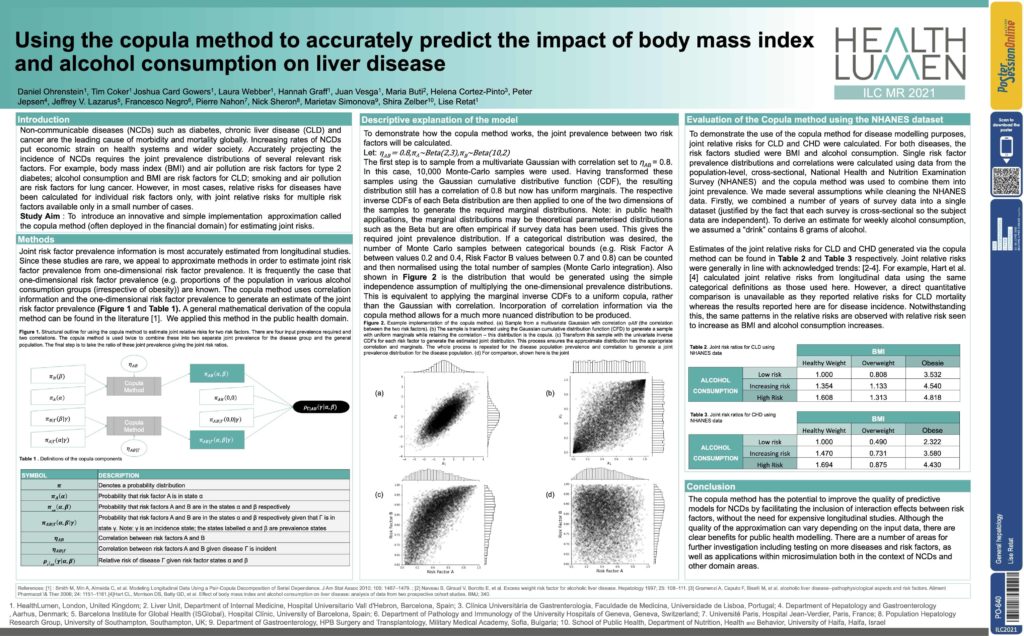
A method for improving NCD modelling using joint risk factors
Accurately projecting the incidence of NCDs requires the joint prevalence distributions of several relevant risk factors. For example, body mass index (BMI) and air pollution are risk factors for type 2 diabetes; alcohol consumption and BMI are risk factors for Chronic Liver Disease; smoking and air pollution are risk factors for lung cancer. However, in most cases, relative risks for diseases have been calculated for individual risk factors only, with joint relative risks for multiple risk factors available only in a small number of cases.
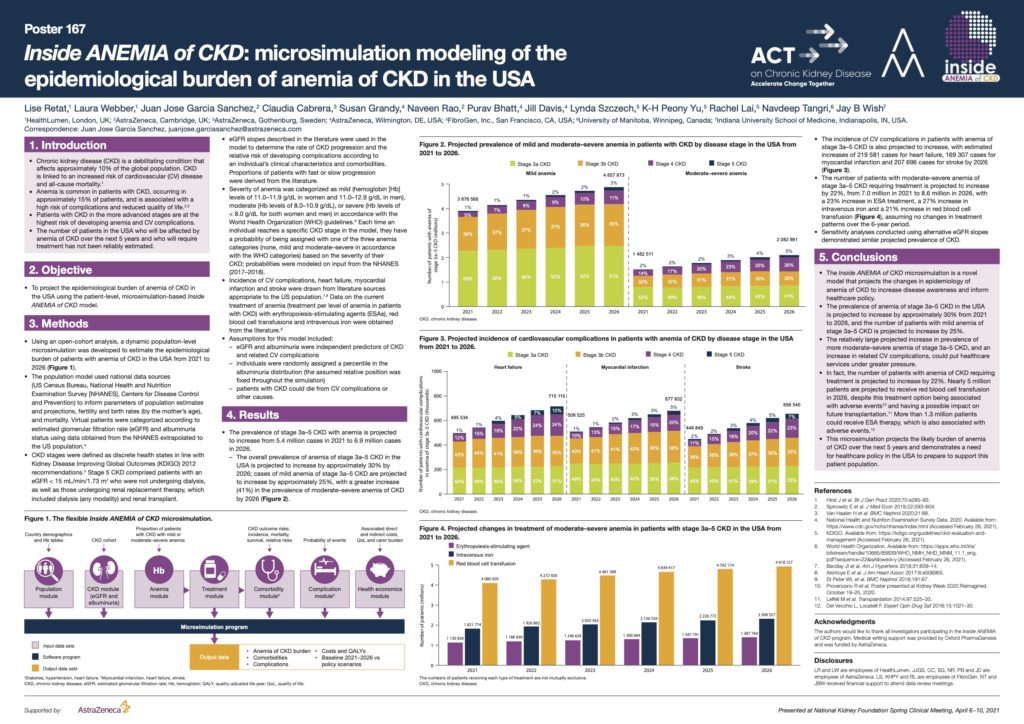
Quantifying the epidemiological burden of anemia of CKD in the USA and Canada via microsimulation modelling
Chronic kidney disease (CKD) is a debilitating condition that affects approximately 10% of the global population. Anemia is common in patients with CKD, occurring in approximately 15% of patients, and is associated with a high risk of complications and reduced quality of life.
The number of patients in the USA and Canada who will be affected by anemia of CKD over the next 5 years and who will require treatment has not been reliably estimated. This study, commissioned by AstraZeneca, projects the epidemiological burden of anemia of CKD in the USA and Canada using a patient-level, microsimulation-model.
In the USA the prevalence of stage 3a–5 CKD with anemia is projected to increase from 5.4 million cases in 2021 to 6.9 million cases in 2026. In Canada, the prevalence of anemia of stage 3a–5 CKD is projected to increase from approximately 1.5 million patients in 2021 to 2.2 million patients in 2026.
The projected increasing prevalence of advanced CKD and associated anemia, as well as the estimated increases in numbers of related cardiovascular (CV) events and patients who will require treatment, could put healthcare systems under greater pressure, and demonstrates a need for healthcare policy in the USA and Canada to prepare to support this patient population.
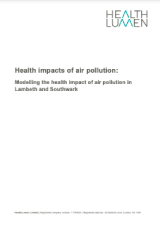
Health impacts of air pollution: Modelling the health impact of air pollution in Lambeth and Southwark
Air pollution has an adverse effect on people’s health, both in the long- and short-term. The Guy’s and St Thomas’ Charity commissioned HealthLumen to undertake a project to quantify the impact of air pollution on the health of the populations of the London boroughs of Lambeth and Southwark. In these areas, the majority of air pollution comes from road traffic, but also from heating and construction emissions. A number of policies have been put in place London-wide to reduce air pollution emissions and therefore prevent related impacts (for example ULEZ and BreatheLondon), as well as locally in Lambeth and Southwark. The findings of this study build on the existing body of knowledge on this topic by quantifying the impact of specific scenarios on air-pollution related health burden.
The key conclusions are that borough-specific and pan-London actions are required alongside local and national legislation and policy if larger health benefits and cost savings are to be made. It is clear that measures to maintain levels of NO2 emissions found during the COVID-19 lockdown and to meet the WHO levels for PM2.5 would have significant health and cost benefits for both Lambeth and Southwark.
View blog post
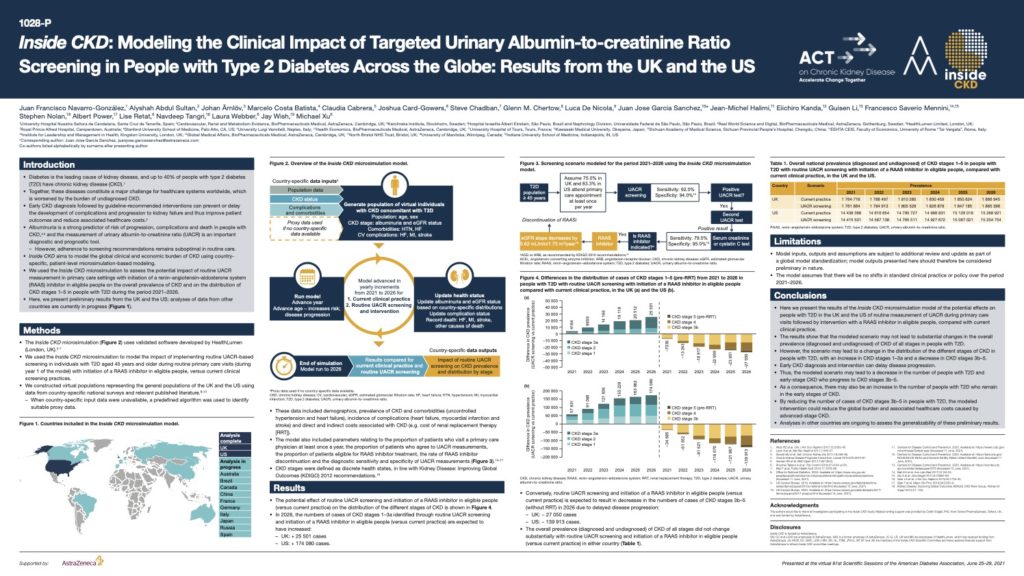
Inside CKD: Modelling the Clinical Impact of Targeted Urinary Albumin-to-creatinine Ratio Screening in People with Type 2 Diabetes Across the Globe
Diabetes is the leading cause of kidney disease, and up to 40% of people with type 2 diabetes (T2D) have chronic kidney disease (CKD) Together, these diseases constitute a major challenge for healthcare systems worldwide, which is worsened by the burden of undiagnosed CKD. Early CKD diagnosis followed by guideline-recommended interventions can prevent or delay the development of complications and progression to kidney failure and thus improve patient outcomes and reduce associated healthcare costs.
Albuminuria is a strong predictor of risk of progression, complications and death in people with CKD and the measurement of urinary albumin-to-creatinine ratio (UACR) is an important diagnostic and prognostic tool.
This poster, presented at the virtual American Diabetes Association’s 81st Scientific Sessions, June 25–29, 2021 demonstrates the potential effects on people with T2D in the UK and the US of routine measurement of UACR during primary care visits followed by intervention with a RAAS inhibitor in eligible people, compared with current clinical practice. By reducing the number of cases of CKD stages 3b–5 in people with T2D, the modelled intervention could reduce the global burden and associated healthcare costs caused by advanced-stage CKD.
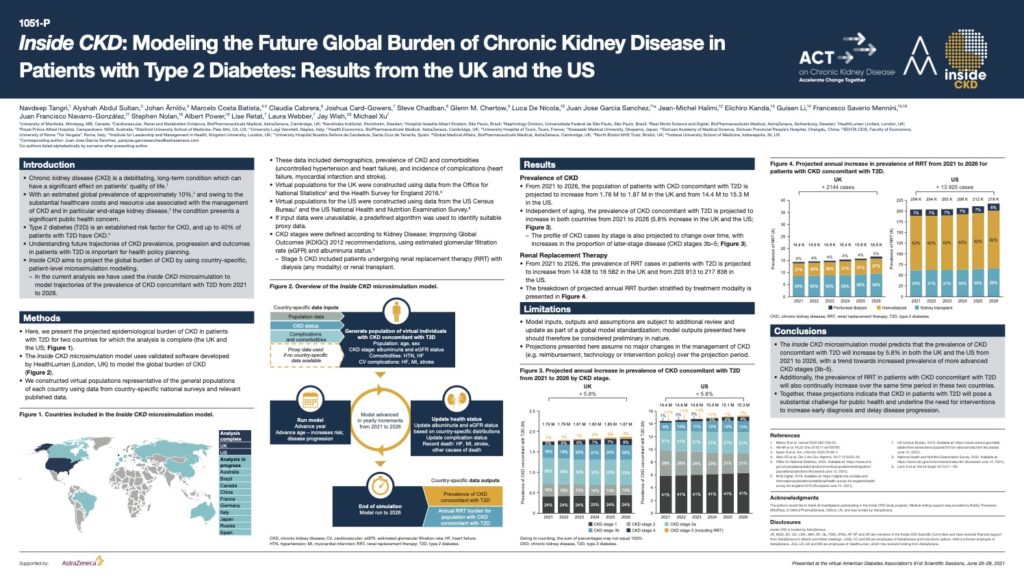
Inside CKD: Modelling the Future Global Burden of Chronic Kidney Disease in Patients with Type 2 Diabetes
Type 2 diabetes (T2D) is an established risk factor for CKD, and up to 40% of patients with T2D have CKD.
This poster, presented at the virtual American Diabetes Association’s 81st Scientific Sessions, June 25–29, 2021 demonstrates that from 2021 to 2026, the population of patients with CKD concomitant with T2D is projected to increase from 1.76 M to 1.87 M in the UK and from 14.4 M to 15.3 M in the US.
These projections indicate that CKD in patients with T2D will pose a substantial challenge to public health and underline the need for interventions to increase early diagnosis and delay disease progression.
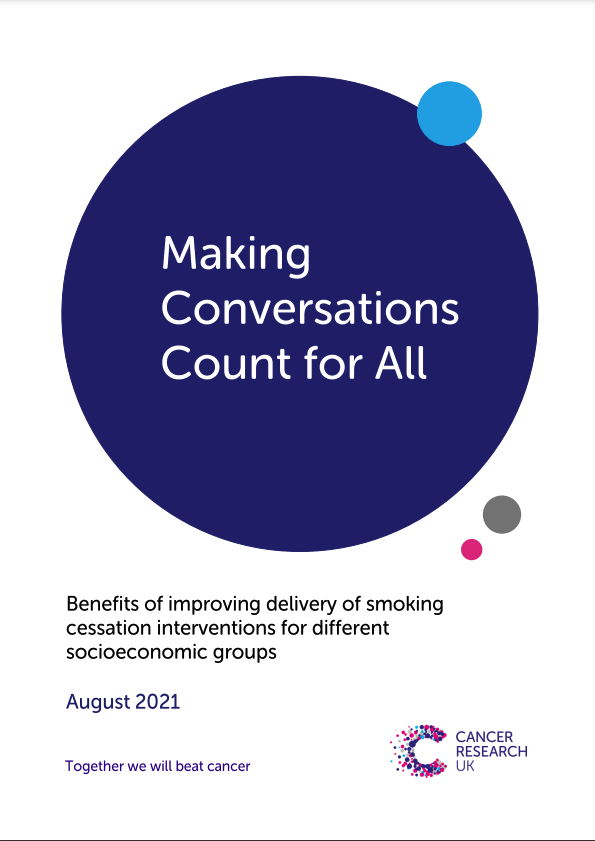
Making Conversations Count for All: Benefits of improving delivery of smoking cessation interventions for different socioeconomic groups.
This study builds on the previous 2020 report by looking at the impact of improving the delivery of three advice-based interventions on different socioeconomic groups, compared with current policy, between 2019-2039. By focusing on socioeconomic status, this study explores one component of deprivation to assess the impact of improving the delivery of these interventions on smoking related health inequalities and associated economic costs in the UK.
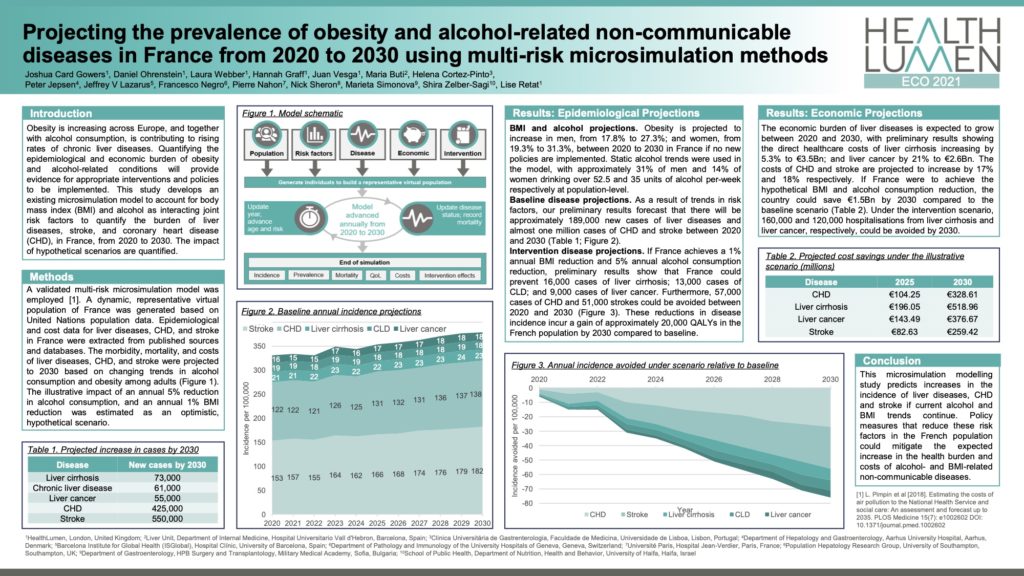
The burden of liver diseases, stroke, and coronary heart disease in France, to 2030
Obesity is increasing across Europe, and together with alcohol consumption, is contributing to rising rates of chronic liver diseases. Quantifying the epidemiological and economic burden of obesity and alcohol-related conditions will provide evidence for appropriate interventions and policies to be implemented. This study develops an existing microsimulation model to account for body mass index(BMI) and alcohol as interacting joint risk factors to quantify the burden of liver diseases, stroke, and coronary heart disease(CHD), in France, from 2020 to 2030. The impact of hypothetical scenarios are quantified.
View overview video
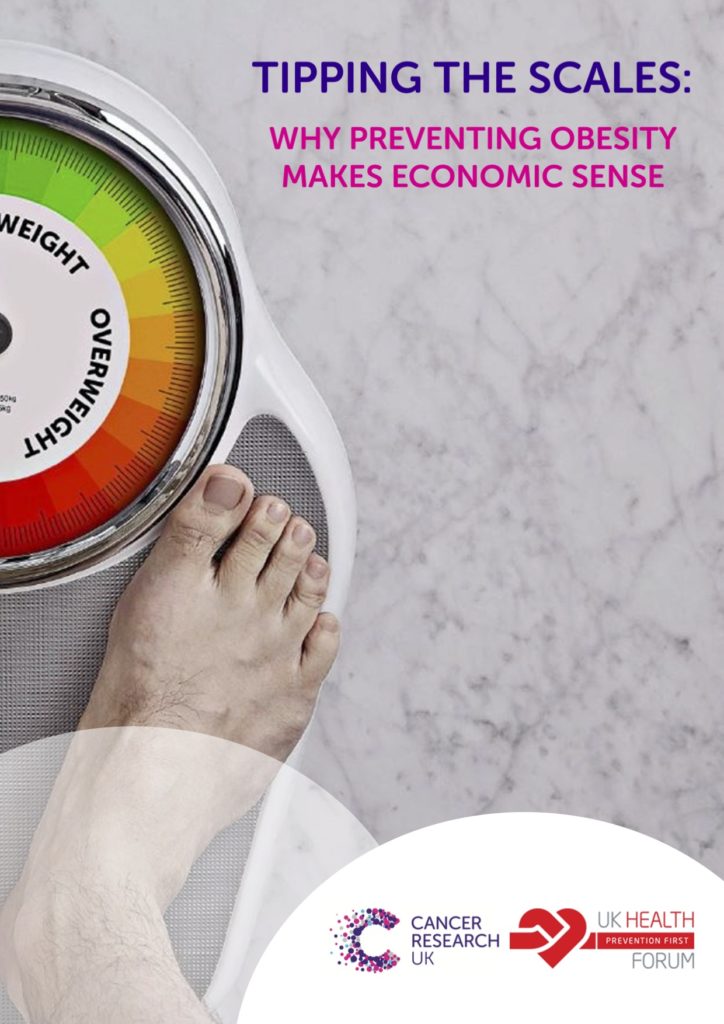
Tipping the scales: Why preventing obesity makes economic sense
Together with Cancer Research UK, we produced a report which looked at the health and economic impact of ever-increasing overweight and obesity rates in the UK. We showed that even a small reduction in obesity prevalence could offset the significant health and economic cost of doing nothing.
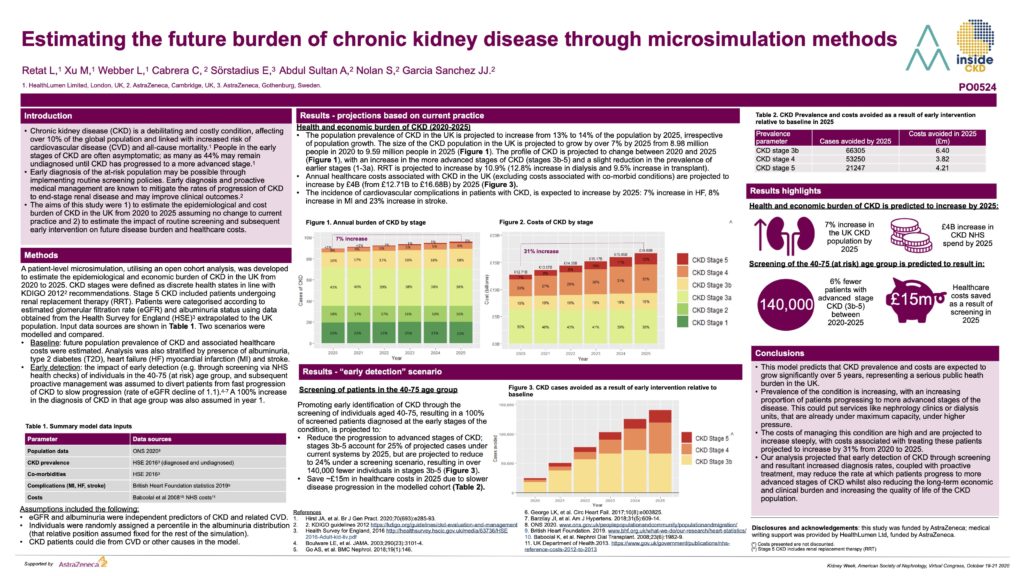
Estimating the future burden of chronic kidney disease through microsimulation methods
Chronic kidney disease (CKD) is a debilitating and costly condition, affecting over 10% of the global population and linked with increased risk of cardiovascular disease (CVD) and all-cause mortality. People in the early stages of CKD are often asymptomatic; as many as 44% may remain undiagnosed until CKD has progressed to a more advanced stage. Early diagnosis of the at-risk population may be possible through implementing routine screening policies. Early diagnosis and proactive medical management are known to mitigate the rates of progression of CKD to end-stage renal disease and may improve clinical outcomes. The aims of this study were 1) to estimate the epidemiological and cost burden of CKD in the UK from 2020 to 2025 assuming no change to current practice and 2) to estimate the impact of routine screening and subsequent early intervention on future disease burden and healthcare costs. Undertaken in partnership with AstraZeneca, this study is now being rolled out to over 20 countries.
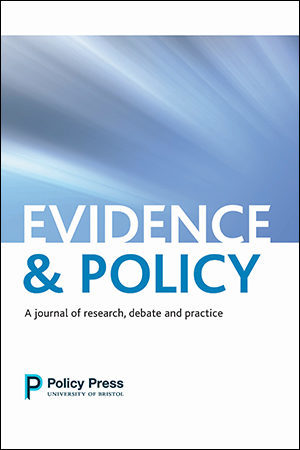
Why we must work toward a recognised international standard in evaluation of upstream interventions
The COVID-19 pandemic has increased interest in Universal Basic Income (UBI) as a means of addressing a range of socio-economic insecurities. While previous trials of cash transfer schemes have often focused on low-level transfers inadequate to satisfy the needs for which the policy was originally developed, emerging pilots are moving toward a position of increasing generosity. Our multidisciplinary project, Examining the Health Case for UBI, has brought together colleagues in behavioural science, public health, epidemiology and economics to establish pathways to health impact.